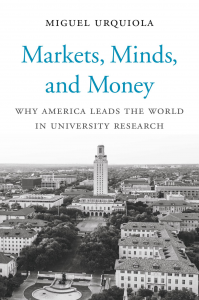
American universities were weak at research into the 1800s—none had the professors or money necessary to compete with European rivals. By contrast, today they lead the world at research. How did a few American schools rise to preeminence? Could their position be reversed?
These questions matter because university research contributes to human welfare. It helped create technologies like the internet and the algorithms and positioning systems used by Google and Uber. It produced medical tools like x-rays and Pap smears. Keeping university research vigorous may thus be crucial to U.S. and world prosperity.
This book focuses on the fact that the U.S. takes a free-market approach to education. It argues that this approach accounts for why American universities were weak at research initially, for why they improved, and for why they have retained their lead.
Coverage/reviews of the book and related work:
Freakonomics Radio (Stephen Dubner, 2022)
Marginal Revolution (Tyler Cowen, 2020)
Journal of Economic Literature (Michael Andrews, 2021)
American Economic Association (podcast interview with Tyler Smith, 2021)
Martin Center (John Staddon, 2020)
Available at Harvard University Press and Amazon.